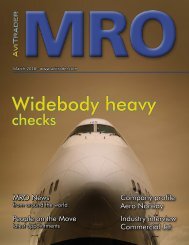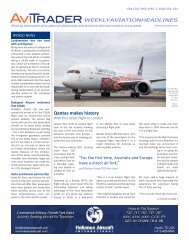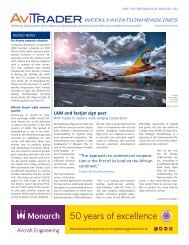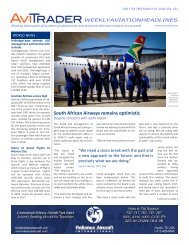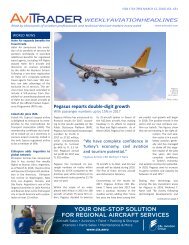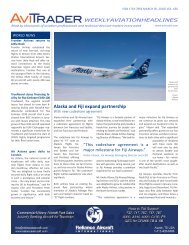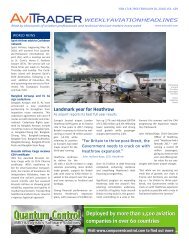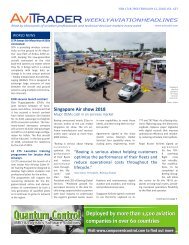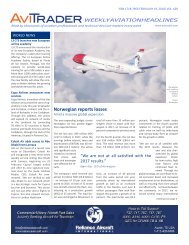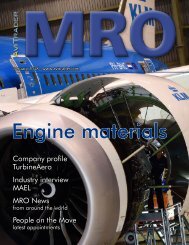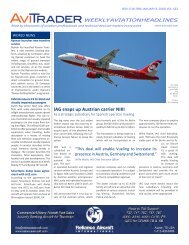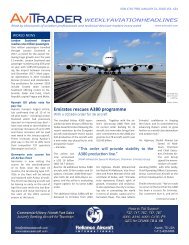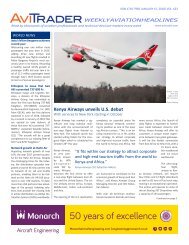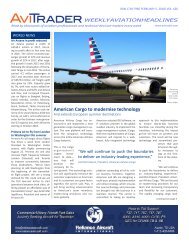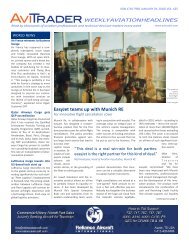AviTrader MRO Magazine 2017-09
AviTrader MRO Magazine 2017-09
AviTrader MRO Magazine 2017-09
Create successful ePaper yourself
Turn your PDF publications into a flip-book with our unique Google optimized e-Paper software.
September <strong>2017</strong> - www.avitrader.com<br />
Airframe<br />
maintenance<br />
Industry interview<br />
Win Air<br />
<strong>MRO</strong> News<br />
from around the world<br />
People on the Move<br />
latest appointments
Editor‘s Page<br />
Published monthly by<br />
<strong>AviTrader</strong> Publications Corp.<br />
Suite 305, South Tower<br />
5811 Cooney Road<br />
Richmond, British Columbia<br />
V6X 3M1<br />
Canada<br />
Email: p.jorssen@avitrader.com<br />
Tel: +1 (424) 644-6996<br />
www.avitrader.com<br />
Trending now<br />
T<br />
he latest 10-year outlook for the commercial<br />
airline transport fleet and the associated<br />
<strong>MRO</strong> market by Oliver Wyman provides<br />
some very valuable insight. Industry experts say<br />
the <strong>MRO</strong> industry will need to evolve significantly<br />
over the next 10 years to meet changing demand<br />
driven by growth, geographic shifts, fleet<br />
mix trends, and new technology.<br />
Meanwhile, the report says the retirement of<br />
aircraft will remain brisk. Small regional jets<br />
and narrow-bodies have been the predominant<br />
source of aircraft retirements, resulting in<br />
a surprisingly young retirement age of about<br />
18 years. However, with many of these smallercapacity<br />
aircraft now purged from the fleet, the<br />
industry can expect retirement ages to climb<br />
again as retirement selections will naturally<br />
revert to older, larger-capacity aircraft. The<br />
significant increase in retirements will continue<br />
to fuel the growing Used Serviceable Material<br />
(USM) market. Increased USM has the potential<br />
of reducing material costs for airlines and<br />
the <strong>MRO</strong> sector.<br />
Over the next ten years, Oliver Wyman forecasts<br />
a significant shift of spend away from<br />
regional jets and turboprops and toward narrow-body<br />
aircraft. Narrow-body <strong>MRO</strong> spend<br />
will see a nearly $21 billion increase to $57<br />
billion by 2027, with its overall market share<br />
rising to 52%.<br />
Clearly, changes in the market of the global<br />
fleet and the increasing prominence of big<br />
data will promote <strong>MRO</strong>s to reevaluate their<br />
operations.<br />
Keith Mwanalushi<br />
Editor<br />
2<br />
Editorial<br />
Keith Mwanalushi, Editor<br />
Email: keith@aeropublications.co.uk<br />
Mobile: +44 (0) 7871 769 151<br />
Design<br />
Volker Dannenmann,<br />
Layout & Design<br />
Email: volker@dannenmann.com<br />
Mobile: +34 657 218706<br />
Advertising inquiries<br />
Jenny Vogel<br />
Head of Sales & Marketing<br />
Email: jenny.vogel@avitrader.com<br />
Tel: +49 (0) 8761 346007<br />
Narrowbodies will dominate airframe <strong>MRO</strong><br />
Photo: Flybe Aviation Services<br />
Registration<br />
<strong>AviTrader</strong> <strong>MRO</strong> is a subscription-free<br />
monthly publication.<br />
To receive a personal copy in your<br />
inbox every month,<br />
please click here to subscribe.<br />
Opinion<br />
Please send your comments<br />
and queries to<br />
keith@aeropublications.co.uk<br />
Contents<br />
<strong>MRO</strong> and Production News ............................................ 4<br />
Finance News .................................................... 10<br />
Other News ...................................................... 15<br />
Information Technology. ............................................. 15<br />
Cover story: Airframe maintenance ..................................... 17<br />
MTU Maintenance ................................................. 21<br />
Industry interview: Kyle Vergeer, Commercial Manager, WinAir ................. 23<br />
Lufthansa Consulting: Digitalisation and <strong>MRO</strong> ............................. 25<br />
People on the Move ................................................ 29<br />
<strong>AviTrader</strong> <strong>MRO</strong> - September <strong>2017</strong>
OUR EXPERIENCE DRIVES YOUR EXCELLENCE.<br />
Iberia’s merger with British Airways has made us stronger. Our technicians<br />
our extended product range and joint resources we can offer you the high<br />
quality service that you demand.<br />
STRONGER TOGETHER.<br />
Iberia Maintenance. Commercial Direction.<br />
28042 Madrid.España. Phone: + 34 91 587 48 27<br />
maintenance@iberia.es / www.iberiamaintenance.com<br />
British Airways Engineering: Technical Block C - Vanguard Way.<br />
Heathrow Airport. Hounslow. TW6 2JA<br />
bae@ba.com / web: www.ba-mro.com<br />
Members de
<strong>MRO</strong> and Production News<br />
4<br />
From the beginning of 2019 onward, Airbus<br />
will offer the new “Airspace XL Bins”, for the<br />
A320 aircraft to the airlines as an alternative<br />
interior to the current versions, which are<br />
also manufactured by FACC.<br />
Spirit AeroSystems develops and leverages<br />
innovative composite technology<br />
Lufthansa Technik will provide component support for Italian airline NEOS’ new fleet of Boeing 787s<br />
Photo: NEOS<br />
LHT to provide component support<br />
for NEOS<br />
The Italian airline NEOS has contracted Lufthansa<br />
Technik to provide comprehensive<br />
component support for its new Boeing 787<br />
fleet. The first Boeing 787-9 is scheduled to be<br />
delivered to NEOS in mid-December <strong>2017</strong>.<br />
Based at Milan-Malpensa Airport, NEOS will<br />
become the country’s first Boeing 787 operator.<br />
The new agreement is an extension<br />
of the existing component support cooperation,<br />
which began as early as 2002. The Total<br />
Component Support (TCS) contract covers<br />
component repair and overhaul, pooling and<br />
home base lease services to support NEOS’<br />
daily operations. The component supply will<br />
be realized via the German Lufthansa Technik<br />
facilities in Frankfurt and Hamburg. In addition,<br />
Lufthansa Technik will provide independent<br />
quality assurance as part of an Aircraft<br />
Production Inspection Program for these three<br />
Boeing 787-9s at the aircraft manufacturer’s<br />
site in Seattle, Washington, USA.<br />
AFI KLM E&M consolidates alliance<br />
with GMF AeroAsia<br />
AFI KLM E&M and long-standing partner GMF<br />
AeroAsia have signed a Letter of Intent emphasizing<br />
the strength of their <strong>MRO</strong> relationship.<br />
On August 28, <strong>2017</strong> the two companies<br />
signed a Letter of Intent (LOI) under which<br />
their cooperation will move up a stage to become<br />
a strategic alliance designed to develop<br />
a range of multi-segment <strong>MRO</strong> products delivering<br />
high value-added maintenance solutions<br />
for the market. This latest commercial<br />
partnership between the two players confirms<br />
their joint determination to combine their respective<br />
strengths to offer a range of unique<br />
<strong>MRO</strong> capabilities in the global marketplace.<br />
The products jointly developed by the two<br />
companies in the framework of the LOI will<br />
be deployed in the Airframe, Components<br />
and Engines products sectors and possibly<br />
beyond. In this way, both AFI KLM E&M and<br />
GMF AeroAsia are aiming to consolidate their<br />
respective positions by seizing the many commercial<br />
opportunities arising on this market.<br />
In 2016, the two parties signed a first Memorandum<br />
of Understanding (MOU) to lay the<br />
foundations of their cooperation in the maintenance<br />
sphere. This was followed by a second<br />
MOU signed in April <strong>2017</strong> which extended<br />
the relationship between the two groups by<br />
implementing an exchange program for their<br />
teams of experts.<br />
FACC AG signs €500 million Airbus<br />
contract<br />
Fischer Advanced Composite Components<br />
(FACC), the Austria-based aerospace company<br />
has signed a €500 million (US$600<br />
million) contract with Airbus for its new<br />
“Airspace“cabin in the A320 family. FACC<br />
will provide the overhead stowage compartments<br />
and ceiling panels, continuing<br />
the 15-year relationship it has had with the<br />
plane manufacturer for the supply of interior<br />
fittings. The contract provides for a supply<br />
volume of more than €500 million. Working<br />
closely with Airbus, FACC is currently<br />
working on the detail development of the<br />
individual components. According to the<br />
contract, the first deliveries for the “Airspace”<br />
cabin will be supplied to Airbus in late 2018.<br />
Spirit AeroSystems has leveraged advanced<br />
composite technology from its Research and<br />
Development portfolio to introduce new work<br />
at the company’s U.K. facility. Scotland’s First<br />
Minister, Nicola Sturgeon, visited Spirit’s site<br />
in Prestwick, Ayrshire, to share details of the<br />
new single-aisle spoiler work on the Airbus<br />
A320 family programs. “We are pleased to<br />
utilize this innovative technology to not only<br />
bring improved quality and savings to our<br />
customer but also to secure new work for our<br />
U.K. facility,” said Scott McLarty, vice president<br />
and general manager of Spirit’s U.K. and<br />
Malaysia facilities. “This is an opportunity for<br />
us to leverage our technology, design, engineering<br />
and manufacturing expertise to better<br />
support the needs of our customers, and it<br />
strengthens our ability to secure future work.”<br />
The Spirit-developed Resin Transfer Molding<br />
(RTM) solution supports the high-volume production<br />
of spoilers and other monolithic components<br />
and promises to deliver improved<br />
quality and significant cost savings. Spirit<br />
will establish a world-class manufacturing<br />
platform involving state-of-the-art automation<br />
and robotics to meet its customer’s rate<br />
demands, which are currently at over 600<br />
spoilers per month. The Scottish government<br />
is providing investment support to secure the<br />
project, which will result in an increase in<br />
headcount at the facility.<br />
Zodiac Aerospace Services appoints<br />
Kapco Global | Avio-Diepen distributor<br />
for select oxygen products<br />
Zodiac Aerospace Services has signed an<br />
agreement appointing Kapco Global | Avio-<br />
Diepen distributor for select oxygen products<br />
designed by Zodiac Oxygen Systems US (Avox<br />
Systems). This will include Passenger Masks,<br />
Chemical Oxygen Generators and Piece Parts<br />
for Oxygen Cylinders. Zodiac Aerospace is a<br />
leader in aerospace equipment and systems<br />
for commercial, regional and business aircraft,<br />
as well as for helicopters and spacecraft.<br />
It develops and manufactures state-of-the-art<br />
solutions to improve comfort and wellbeing<br />
on board aircraft, and high-technology systems<br />
to increase aircraft performance and<br />
flight safety.<br />
<strong>AviTrader</strong> <strong>MRO</strong> - September <strong>2017</strong>
<strong>MRO</strong> and Production News<br />
5<br />
STS Aviation Group has continued its recent<br />
expansion by acquiring the assets of Aero-<br />
Mod International to launch a brand-new<br />
business known as STS Mod Center. STS Mod<br />
Center is fully operational and based out of a<br />
114,500 ft², state-of-the-art hangar facility in<br />
Melbourne, Florida. The company employs a<br />
highly skilled team of on-site and mobile aircraft<br />
maintenance technicians and engineers<br />
that can expertly accommodate all military,<br />
commercial and civil aircraft modification requirements.<br />
“STS Aviation Group is continuing<br />
its high-growth strategy, and with the addition<br />
of this new hangar facility, we now have<br />
the ability to perform a variety of avionics and<br />
structural aircraft modification services for<br />
airline, leasing companies and OEM customers<br />
both at our new Melbourne facility or onsite<br />
at their location,” stated PJ Anson, CEO<br />
of STS Aviation Group. “We already have certifications<br />
in place, and the team is up, running<br />
and ready for action.” STS Mod Center<br />
has secured the following national and international<br />
certifications: FAA 145, EASA 145,<br />
ANAC 145, AS 9110B, AS 9100.<br />
Qantas chooses Airbus to upgrade its cabins of A380 fleet<br />
Photo: Airbus<br />
Qantas chooses Airbus to upgrade<br />
cabins of A380 fleet<br />
Qantas has reached an agreement with Airbus<br />
to upgrade its 12 flagship A380 cabins to<br />
further improve passenger comfort on longhaul<br />
operations, while maximizing economy.<br />
In particular, the new interior takes advantage<br />
of the A380’s large floor area to efficiently<br />
embody Qantas’ latest seat products for Business<br />
Class and Premium Economy. Airbus<br />
will be responsible for the overall upper-deck<br />
integration. In addition, Airbus will develop<br />
specific tailored monuments for Qantas and<br />
a new and unique business lounge area in the<br />
forward upper-deck. The installation phase<br />
will start in Q2 2019. All 12 aircraft are<br />
planned to be upgraded by around the end<br />
of 2020. Photo: Airbus, Text: Qantas chooses<br />
Airbus to upgrade its cabins of A380 fleet.<br />
Iberia launches new Vocational Training<br />
degree on Aircraft Maintenance<br />
together with the Madrid regional<br />
government<br />
Iberia and the Education, Youth and Sport Bureau<br />
of the Madrid Regional Government have<br />
reached an agreement to develop a Vocational<br />
Training degree that will be held, starting in October,<br />
at two Secondary Schools in Madrid. A<br />
total of 50 students, 25 per school, may enroll<br />
each year in the Advanced Vocational Training<br />
degree in Aeromechanical Maintenance. The<br />
duration of the Iberia Campus Aircraft Maintenance<br />
course will be two school years. In the<br />
first year, classes will be held in the schools, and<br />
in the second year the training will be chiefly<br />
held at Iberia’s maintenance facilities in La Muñoza,<br />
near the Madrid airport, with 40% of the<br />
training to be given in the classroom and the<br />
remaining 60% in workshops. Students taking<br />
part in this Vocational Training degree, who<br />
will earn the qualification of Advanced Technician,<br />
may complete their practical training in<br />
Iberia’s aircraft maintenance workshops in a<br />
third year, during which they may sit for European<br />
Air Safety Agency Category B examinations.<br />
Successful examinees will be qualified for<br />
employment as aircraft maintenance technicians<br />
in all European Union member states and<br />
throughout the European Economic Space. In<br />
the second and third years, the students will be<br />
awarded a grant.<br />
TAM to cargo convert Saab 340B for<br />
Alandia Air<br />
Täby Air Maintenance, TAM, has signed a<br />
contract with Alandia Air of Mariehamn,<br />
Åland (Finland), for the conversion of one of<br />
their Saab 340Bs to cargo configuration. The<br />
aircraft – c/n 224 with the registration N9CJ<br />
– will be ferried from the United States, due to<br />
arrive in TAM’s main overhaul facility at Örebro<br />
airport on September 8 th . Alanda Air is<br />
specialized in operating leases primarily for<br />
SAAB 340s.<br />
STS Aviation Group purchases state-ofthe-art<br />
aircraft hangar facility in Florida<br />
StandardAero to provide engine and<br />
APU <strong>MRO</strong> services for Nordica Airlines<br />
StandardAero has been selected by Regional<br />
Jet OÜ, operating as Nordica Airlines, to provide<br />
<strong>MRO</strong> services for Honeywell RE220 auxiliary<br />
power units (APUs) on its fleet of CRJ-700<br />
and 900 fleet aircraft and <strong>MRO</strong> services for<br />
Pratt & Whitney Canada (P&WC) PW127M<br />
turboprop engines powering its fleet of ATR-<br />
600 aircraft. Nordica is the flag carrier for<br />
Estonia and a strategic partner to LOT Polish<br />
Airlines. Nordica is headquartered in Tallinn,<br />
Estonia and based at Lennart Meri Tallinn Airport,<br />
where it serves at the largest air carrier<br />
at that airport.<br />
Boeing Shanghai completes base<br />
maintenance and Wi-Fi modification<br />
for first Chinese Customer<br />
Boeing Shanghai Aviation Services and Xiamen<br />
Air celebrated the completion of the first<br />
787-8 base maintenance check, also known<br />
as a C-check, and Wi-Fi modification at Boeing<br />
Shanghai’s hangar at Shanghai Pudong<br />
Airport. The relationship with Xiamen Air<br />
solidifies Boeing Shanghai’s position in the<br />
global market for 787 heavy maintenance<br />
and connectivity modifications as it enters<br />
China’s market.<br />
AFI KLM E&M to support Delta Air<br />
Lines A350 fleet<br />
AFI KLM E&M has entered into an agreement<br />
with Delta Air Lines to provide component support<br />
for the U.S. carrier’s entire Airbus A350<br />
fleet as well as a reciprocal component agreement<br />
which takes advantage of Delta TechOps<br />
component capabilities. The maintenance solutions<br />
to be performed by AFI KLM E&M cover<br />
component repairs and access to its A350<br />
spares pool, primarily in the U.S. and Europe.<br />
<strong>AviTrader</strong> <strong>MRO</strong> - September <strong>2017</strong>
The care that<br />
your engine<br />
deserves<br />
Visit us at<br />
<strong>MRO</strong> Europe <strong>2017</strong><br />
Booth#1352<br />
Trueaero<br />
The very first e-platform in the aviation market for leasing, purchasing and<br />
transporting aircraft engine stands via online booking, aiming to provide an easy<br />
and fast solution for airlines, <strong>MRO</strong>s, engine shops, engine manufacturers, asset<br />
owners as well as freight forwarders. EngineStands24 provides a wide selection<br />
of brand-new, OEM approved engine stands equipped with online tracking<br />
system. Customers are provided with specialised engine warehousing facilities<br />
all around the globe, 24/7 AOG support and tailor-made product packages.<br />
www.enginestands24.com<br />
Powered by<br />
In cooperation with
<strong>MRO</strong> and Production News<br />
7<br />
CRJ440 and Challenger 604/605/850 aircraft.<br />
Jet Maintenance Solutions is a member<br />
of the Avia Solutions Group family.<br />
50th-A320-Family-fuselage-shipped-for-US-assembly<br />
Photo: Airbus<br />
Elements for the 50 th made-in-America<br />
A320 Family jetliner are shipped from<br />
Germany<br />
Components for the 50 th A320 Family aircraft<br />
to be built in the United States are now<br />
on their way to Mobile, Alabama, marking<br />
another milestone for Airbus’ global network<br />
of jetliner final assembly facilities. A sea-going<br />
ship carrying large components for the<br />
single-aisle jetliner – including the front and<br />
aft fuselage sections, wings, vertical tail and<br />
horizontal tail – departed Hamburg, Germany<br />
on August 25, beginning a 29-day transatlantic<br />
voyage to the U.S. Gulf Coast. These<br />
components, along with a separate inventory<br />
of smaller parts to be forwarded on another<br />
ship, will come together as the 50th aircraft<br />
assembled at the Airbus U.S. Manufacturing<br />
Facility – which is situated on the Mobile<br />
Aeroplex at Brookley. Hamburg shipped the<br />
first components to Mobile in May 2014, and<br />
the first American-built aircraft – an A321<br />
version – was delivered in 2016. Today, the<br />
Airbus U.S. Manufacturing Facility is on track<br />
with its ramp-up to reach an output rate of<br />
four aircraft per month at the end of <strong>2017</strong>.<br />
Airbus has four assembly sites around the<br />
world for A320 Family aircraft. In addition<br />
to Mobile in the U.S. and Hamburg in Germany,<br />
they are located at Toulouse, France<br />
and Tianjin, China.<br />
Jet MS adds Bombardier Global<br />
5000/6000 to its capabilities<br />
Jet Maintenance Solutions (JET MS), a global<br />
provider of integrated aircraft maintenance,<br />
repair and overhaul solutions for business<br />
and regional aviation, has received all relevant<br />
approvals to launch Bombardier Global<br />
5000/6000 jet type maintenance. Having<br />
undergone technical personnel training,<br />
obtained all necessary approvals, as well<br />
as CAA’s certificate earlier this month, Jet<br />
Maintenance Solutions is now ready to provide<br />
its quality services to the operators and<br />
owners of Bombardier Global 5000/6000<br />
aircraft. The <strong>MRO</strong> will support large cabin<br />
business jet operators and owners with base,<br />
line maintenance and spare parts supply<br />
services in accordance to its EASA Part-145<br />
certificate. In addition to the recently added<br />
Bombardier Global 5000/6000 certificate,<br />
Jet Maintenance Solutions is also fully qualified<br />
to provide maintenance, repair and<br />
overhaul services for the Hawker Beechcraft<br />
700/750/800/800XP/850XP/900XP, as<br />
well as the Bombardier CRJ100/CRJ200/<br />
Daher to support Airbus Helicopters’<br />
metallic aerostructures activities<br />
On August 29, Daher inaugurated its newest<br />
logistics and industrial facility, which<br />
supplies Airbus Helicopters’ facility in<br />
Querétaro, Mexico, dedicated to metallic<br />
aerostructures activities. Located in a<br />
3,200-m² building, this facility supplies Airbus<br />
Helicopters’ nearby production center<br />
of metallic aerostructures, which notably<br />
includes the production of overwing emergency<br />
exit doors and bulk cargo compartment<br />
doors for single-aisle jetliners. Daher’s<br />
responsibilities at its new Querétaro<br />
site underscore the company’s expertise<br />
across a full spectrum of capabilities, from<br />
product and process engineering, industrial<br />
services and machining, to supply chain<br />
logistics and transportation. The scope of<br />
Daher’s operations at Querétaro includes<br />
forecasting and procurement of parts and<br />
chemicals required for the A320 door production;<br />
management of inbound material<br />
shipped by Airbus Helicopters in Germany<br />
to Mexico; customs clearance; along<br />
with inspection and warehousing. After the<br />
material is accepted in Daher’s Querétaro<br />
facility, the company performs on-site<br />
pre-cutting of aluminum plates used in the<br />
doors, then delivers all door components to<br />
Airbus Helicopters for assembly. The process<br />
is completed by Daher’s reception of<br />
the finished doors from Airbus Helicopters;<br />
followed by their packaging and shipment<br />
to A320 final assembly lines. This new operation<br />
also reinforces Daher’s presence<br />
in Mexico, positioning it for the anticipated<br />
expansion of Airbus Helicopters’ production<br />
at the location, and for future business opportunities<br />
within the Querétaro region – a<br />
major aerospace manufacturing cluster – as<br />
well as elsewhere in the country to serve aviation,<br />
automotive and other sectors. Daher<br />
already has a factory in Nogales, Mexico,<br />
where it produces composite airframes.<br />
<strong>AviTrader</strong> <strong>MRO</strong> - September <strong>2017</strong>
<strong>MRO</strong> and Production News<br />
8<br />
EngineStands24 purple<br />
Photo: Magnetic <strong>MRO</strong><br />
Magnetic <strong>MRO</strong> and Kuehne+Nagel<br />
launch 1 st joint aerospace hub<br />
After Magnetic <strong>MRO</strong> and Kuehne+Nagel<br />
announced their cooperation agreement in<br />
October 2016 to offer global engine stand<br />
management solutions via Magnetic <strong>MRO</strong>‘s<br />
EngineStands24 project, they signed a working<br />
agreement in summer <strong>2017</strong> to dispatch<br />
engine stands in strategic KN EngineChain<br />
hubs. KN EngineChain is an innovative endto-end<br />
integrated supply chain solution for<br />
the aerospace industry that takes care of valuable<br />
engines with complete reliability. On this<br />
basis, Amsterdam had been selected as the<br />
first station, which has been physically up and<br />
running, in order to provide transportation<br />
and storage of aerospace engine stands all<br />
around the world. After the work agreement,<br />
EngineStands24 has officially launched the<br />
project and leased out its first engine stands<br />
from the 1st joint aerospace hub. Amsterdam<br />
station today facilitates Magnetic <strong>MRO</strong>branded<br />
CFM56-3, CFM56-5A/B, CFM56-<br />
5C, CFM56-7B, V2500 stands, and is getting<br />
ready to expand the variety in the near future<br />
by accommodating also CF6-80, CF34-8,<br />
CF34-10, PW, Trent and LEAP engines.<br />
CHC signs HCare full-by-the-hour<br />
contract for H175<br />
CHC Helicopter has signed a contract with<br />
Airbus Helicopters for an HCare Smart fullby-the-hour<br />
(FBH) contract. It will support<br />
a smooth entry into service for CHC’s first<br />
medium-twin H175. CHC Helicopter has<br />
signed an HCare services contract to cover<br />
the operator’s H175 helicopter, based in<br />
Aberdeen, Scotland. Under this nose to tail<br />
contract, Airbus Helicopters is entrusted with<br />
providing all spare parts and repairable<br />
items for CHC’s H175. As one of the leading<br />
helicopter operators for, notably, oil and gas<br />
exploration in the North Sea, CHC provides<br />
offshore transportation to the oil and gas industry,<br />
emergency medical services (EMS) and<br />
search and rescue (SAR) operations, training<br />
and maintenance, repair and overhaul (<strong>MRO</strong>)<br />
services. Thanks to this HCare contract, CHC<br />
will also benefit from the support of the Airbus<br />
Helicopters Fleet Center in Aberdeen, which<br />
provides access to a dedicated local stock of<br />
parts to ensure maximum reactivity. This stock<br />
is accessible 24/7 to ensure parts are available<br />
when needed.<br />
Flitetec appoints FL Technics as exclusive<br />
representative in Europe<br />
and the CIS<br />
FL Technics, a global provider of one-stopshop<br />
aircraft maintenance, repair and overhaul<br />
services, has announced the signing<br />
of an exclusive distribution agreement with<br />
Flitetec, an aircraft interior plastics manufacturer.<br />
As per the contract, FL Technics will represent<br />
the UK-based company in 21 countries<br />
across Central and Eastern Europe, and the<br />
CIS. As the sole representative of Flitetec in<br />
Russia, Armenia, Azerbaijan, Belarus, Estonia,<br />
Georgia, Kazakhstan, Kyrgyzstan, Latvia,<br />
Lithuanian, Moldova, Slovakia, Tajikistan,<br />
Turkmenistan, Ukraine, Uzbekistan, Poland,<br />
Hungary, Bulgaria, Romania and the Czech<br />
Republic, FL Technics will provide operators<br />
and <strong>MRO</strong>s with quality non-structural vacuum<br />
formed plastic moldings and assemblies for<br />
passenger and crew seats, covers, work stations,<br />
interiors screens, panels, etc.<br />
Mobil Jet Oil 387 now approved<br />
for Pratt & Whitney’s PurePower<br />
PW1100G-JM and PW1400G-JM<br />
Geared Turbofan engines<br />
ExxonMobil has released that Mobil Jet Oil<br />
387, a synthetic High-performance Capability<br />
turbine engine oil, has been approved<br />
by Pratt & Whitney for use in its PurePower<br />
PW1100G-JM and PW1400G-JM Geared<br />
Turbofan engines. PurePower PW1100G-<br />
JM engines power the A320neo aircraft,<br />
while the PW1400G-JM is used on the Irkut<br />
MC-21 mid-range airliner. “With its exceptional<br />
load-carrying capabilities and ability<br />
to maintain film thickness between moving<br />
components, Mobil Jet Oil 387 is well suited<br />
to protect the advanced gearboxes used in<br />
PW1100G-JM and PW1400G-JM engines<br />
from demanding operating conditions,” said<br />
Vipin Rana, global aviation lubricants sales<br />
manager at ExxonMobil. In addition to its<br />
load-carrying capabilities, Mobil Jet Oil 387<br />
delivers a combination of benefits that have<br />
never before been achieved with an HTS or<br />
HPC turbine oil, including outstanding deposit<br />
control, oxidative stability, seal compatibility<br />
and wear protection, as well as lowtemperature<br />
fluidity. Since its introduction in<br />
late 2012, Mobil Jet Oil 387 has accumulated<br />
nearly one million hours of on-wing<br />
performance. It is now being used to protect<br />
more than 250 aircraft operated by carriers<br />
around the world.<br />
Boeing Helena site expands to support<br />
777X airplane production<br />
Boeing has announced the 90,000 ft² expansion<br />
of Boeing Helena to support 777X<br />
airplane production. Boeing Helena is set to<br />
install new machine tools to fabricate critical<br />
titanium parts for the 777X. “Our investment<br />
in Boeing Helena is a testament to our<br />
incredible, hard-working team members<br />
and their ability to deliver on our commitments<br />
to The Boeing Company,” said Kim<br />
Smith, vice president and general manager.<br />
“It further positions our highly-skilled Montana<br />
team of nearly 150 employees as a key<br />
partner for Boeing Commercial Airplanes.”<br />
Now more than 257,000 ft², Boeing Helena<br />
has distinguished itself as a vital part<br />
of the supply chain, specializing in complex<br />
machining of hard metals for Boeing Commercial<br />
Airplanes 737, 747, 767, and 787<br />
airplane models – and now the 777X. The<br />
new parts machined in Helena for the 777X<br />
will include side-of-body chords, and terminal<br />
end fittings which connect the wings to<br />
the fuselage.<br />
<strong>AviTrader</strong> <strong>MRO</strong> - September <strong>2017</strong>
BEST PARTNER<br />
VAS Aero Services provides high quality parts to worldwide<br />
customers and maintains excellent customer satisfaction.<br />
Our industry-leading quality requirements are a key element<br />
to our success in the industry.<br />
We continually evaluate our processes to ensure we<br />
are always providing the best, and most up-to-date,<br />
quality assurance services for our customers.<br />
www.vas.aero
<strong>MRO</strong> and Production News<br />
10<br />
Bombardier Business Aircraft and<br />
MAGA Aviation expand Authorized<br />
Service Center agreement<br />
MAGA Aviation of Campinas, Bombardier<br />
Business Aircraft’s maintenance support<br />
partner in Brazil and South America, recently<br />
received approval to carry out maintenance<br />
on Bombardier Global Express and Global<br />
5000 aircraft models. MAGA Aviation has<br />
been a Bombardier Authorized Service Facility<br />
(ASF) since 2013. With operations based<br />
at Aeroporto de Amarais Campinas in the<br />
state of São Paulo, Brazil, MAGA Aviation<br />
is certified by the Agência Nacional de Aviação<br />
Civil (ANAC) to perform maintenance<br />
work on all Learjet and Global jets, as well<br />
as most Challenger aircraft models. MAGA<br />
works in close collaboration with Bombardier’s<br />
Field Service Representatives in nearby<br />
São Paulo to provide integrated support to<br />
business aircraft customers based in or flying<br />
through the region. MAGA Aviation can<br />
dispatch an Aircraft On Ground (AOG) team<br />
and a fully equipped mobile truck anywhere<br />
in South America to get the aircraft flying<br />
again with minimal delay.<br />
P&WC continues global service network<br />
expansion<br />
Pratt & Whitney Canada (P&WC) has announced<br />
at LABACE <strong>2017</strong> that it has appointed<br />
its second Designated Maintenance<br />
Facility (DMF), RICO Taxi Aéreo (RICO), under<br />
the company’s new global network expansion<br />
model. Based in Manaus, Amazonas, Brazil,<br />
RICO will serve customers of PT6A engines<br />
which power Cessna Caravan and Embraer<br />
Bandeirante aircraft. The DMF will help grow<br />
P&WC’s local footprint in Brazil by providing<br />
customers with increased availability and accessibility<br />
to a broad array of P&WC maintenance<br />
services, tools, and spare parts designed<br />
to deliver faster service. RICO joins<br />
newly appointed ABA (ABA Manutencao de<br />
Aeronaves LTDA., Barreiras, Brazil) to serve<br />
P&WC customers in the country.<br />
Finance News<br />
Thales completes acquisition of Guavus, a pioneer in<br />
real-time Big Data analytics<br />
Thales has closed the acquisition of US company Guavus, a pioneer<br />
in real-time Big Data analytics. Guavus is perfectly suited to<br />
help Thales address the growing needs of an increasingly connected<br />
global ecosystem. The company has built a recognized industrial<br />
“Big Data” platform particularly adapted to real-time analytics and<br />
designed to be easily implemented across any number of new markets.<br />
Headquartered in San Mateo, California, in Silicon Valley, the<br />
company employs 250 people, of which 60 are based in California,<br />
50 in Montreal (Canada) and 140 in Gurgaon (India). Its revenues<br />
are expected to exceed US$30m for the current fiscal year.<br />
The impact of this acquisition on Thales’ <strong>2017</strong> EBIT should be nonmaterial.<br />
This business will be assigned to the Defense & Security<br />
operating segment.<br />
United Technologies agrees to buy Rockwell Collins for<br />
US$30bn<br />
United Technologies, the jet-engine maker, has agreed to buy Rockwell<br />
Collins, the aircraft parts manufacturer, for US$30bn, including<br />
any debt. It has also been confirmed that the Rockwell Collins and<br />
UTC aerospace systems operations will be merged to create a new<br />
business unit, Collins Aerospace Systems.<br />
The basis of the deal will see Rockwell Collins’ shareholders receiving<br />
US$140.00 per share in both stock and cash – US$93.33 in<br />
cash and US$46.67 in United Technologies stock according to a<br />
statement from the companies. This offer is based on a premium of<br />
US$18.00 to Rockwell Collins’ closing share price on August 3, the<br />
day prior to media reports of the Rockwell bid.<br />
According to a statement from UTC’s chairman and chief executive<br />
officer, Greg Hayes, “This acquisition adds tremendous capabilities<br />
to our aerospace businesses and strengthens our complementary<br />
offerings of technologically advanced aerospace systems.” He then<br />
added that “Together, Rockwell Collins and UTC Aerospace Systems<br />
will enhance customer value in a rapidly evolving aerospace industry<br />
by making aircraft more intelligent and more connected.”<br />
The offer includes US$7 billion in Rockwell’s debt, but is expected to<br />
save more than $500 million by the fourth year after its completion,<br />
according to a statement from the two companies.<br />
Morgan Stanley & Co was the financial adviser to United Tech and<br />
Wachtell, Lipton, Rosen & Katz was its legal adviser.<br />
J.P. Morgan Securities LLC and Citigroup Global Markets Inc were<br />
Rockwell’s financial advisers, while Skadden, Arps, Slate, Meagher<br />
& Flom was its legal advisor.<br />
BOC Aviation reports first half <strong>2017</strong> performance<br />
BOC Aviation has reported its unaudited results for the six months<br />
ended June 30, <strong>2017</strong>. Total revenues and other income rose 16% to<br />
US$670m. Net profit after tax was US$240m, an increase of 13%<br />
over the first half of 2016. Total assets increased 7% to US$14.4bn<br />
as at June 30, <strong>2017</strong> from 31 December 2016. BOC Aviation maintained<br />
strong liquidity with US$333m in total cash and fixed deposits,<br />
and US$4bn in undrawn committed credit facilities as at June<br />
30, <strong>2017</strong>. The company raised more than US$1bn in new financing.<br />
Portfolio utilization and cash collection from airline customers of<br />
99.6% and 100%, respectively.<br />
In addition, the Board of Directors has announced a change to the<br />
dividend policy, increasing the intended annual dividend payout to<br />
up to 35% of net profit after tax, up from 30% previously. BOC Aviation’s<br />
operational transactions as at June 30, <strong>2017</strong> included a portfolio<br />
of 297 owned and managed aircraft, with an average aircraft<br />
age of 3.1 years and an average remaining lease term of 7.8 years<br />
for the owned aircraft fleet, each weighted by net book value. The<br />
company has an orderbook of 196 aircraft scheduled for delivery<br />
over the period from July 1, <strong>2017</strong> to 2021 and it took delivery of 37<br />
aircraft (including three acquired by airline customers on delivery) in<br />
the first half of <strong>2017</strong>.<br />
Platinum Equity to acquire Pattonair<br />
Platinum Equity has signed a definitive agreement to acquire global<br />
aerospace and defense supply chain provider Pattonair from Expo-<br />
<strong>AviTrader</strong> <strong>MRO</strong> - September <strong>2017</strong>
Finance News<br />
12<br />
nent Private Equity. Financial terms of the transaction were not disclosed.<br />
The transaction is expected to close during the fourth quarter<br />
of <strong>2017</strong>. Headquartered in Derby, UK, Pattonair is a leading global<br />
supply chain provider boasting a 40-year legacy of excellence and<br />
innovation in the sector. The company supports blue chip engine<br />
and airframe manufacturers and <strong>MRO</strong> customers with tailored supply<br />
chain management solutions. It offers a global service though<br />
dedicated facilities in Singapore, China, Poland, Brazil, Canada<br />
and five cities in the United States.<br />
HEICO Corporation signs agreement to buy AeroAntenna<br />
Technology<br />
HEICO Corporation has reported that its Electronic Technologies<br />
Group has entered into a stock purchase agreement to acquire<br />
100% of the stock of AeroAntenna Technology Inc. (AAT). Chatsworth,<br />
CA-based AAT is a leader in the design and production of<br />
high-performance active antenna systems for critical defense applications,<br />
precision-guided munitions, commercial aircraft and other<br />
commercial uses. AAT is a known leader in numerous antenna types,<br />
including GPS, aircraft navigation and satellite communications antennas.<br />
HEICO stated the purchase price is US$316.5m in cash to<br />
be paid at closing, subject to typical post-closing adjustments, and<br />
a US$20m cash earnout payment if AAT meets its earnings targets.<br />
This transaction is the largest purchase in HEICO’s history. The purchase<br />
price includes approximately US$37m to compensate the sellers<br />
for certain tax elections which will result in a net cash tax benefit<br />
to HEICO worth at least that amount. HEICO expects the acquisition<br />
to be accretive to its earnings within the first year following closing<br />
and stated that the purchase price falls within the typical earnings<br />
multiple the Company targets for acquisitions. HEICO will finance<br />
the purchase through its cash balances and existing revolving credit<br />
facility. Additional financial details were not disclosed.<br />
ST Engineering reports lower profits in second-quarter <strong>2017</strong><br />
Singapore Technologies Engineering (ST Engineering) has announced<br />
that group revenue for its second quarter ended 30 June,<br />
<strong>2017</strong> (2Q<strong>2017</strong>) came in 8% higher at S$1.76bn compared to<br />
S$1.62bn in the same period last year. Group quarterly profit before<br />
tax (PBT) fell 12% year-on-year to S$149.8m from S$170.3m,<br />
mainly due to an S$8.1m loss from the Marine sector impacted by<br />
weak industry conditions and its US operations. Profit attributable<br />
to shareholders (Net profit) at S$111.5m was 12% lower compared<br />
to S$127.3m the year before. At the business sector level compared<br />
to the same period last year, revenue for the Aerospace sector<br />
was comparable at S$639m, and its PBT grew 6% to S$78.9m<br />
from S$74.2m. Commercial sales and defense sales accounted for<br />
64% or S$1.1bn and 36% or S$0.7bn respectively of the group’s<br />
2Q<strong>2017</strong> revenue. Order book remained strong at S$13.5bn, com-<br />
100<br />
95<br />
75<br />
25<br />
5<br />
0<br />
PEMCO AvTr Ad 9 <strong>2017</strong>2<br />
Monday, September 11, <strong>2017</strong> 12:32:32 PM<br />
<strong>AviTrader</strong> <strong>MRO</strong> - September <strong>2017</strong>
<strong>MRO</strong> EUROPE<br />
<strong>2017</strong><br />
LONDRES<br />
OCT 4-6<br />
BOOTH 1043<br />
DUBAI<br />
AIRSHOW<br />
NOV 12-16<br />
FRENCH PAVILION
Finance News<br />
14<br />
pared to S$13.3bn as at end March <strong>2017</strong>. (US$1.00 = S$1.37 at<br />
time of publication.)<br />
DAE completes acquisition of AWAS<br />
Dubai Aerospace Enterprise (DAE) has completed the previously announced<br />
acquisition of the AWAS group of companies. The acquisition<br />
of AWAS propels DAE into the top tier of global aircraft lessors.<br />
DAE will now conduct its aircraft leasing business using the DAE<br />
Capital brand name. DAE Capital now features an owned, managed<br />
and committed fleet of approximately 400 aircraft with a value<br />
of over US$14bn and full service capability to 117 airline customers<br />
in 57 countries from offices in Dubai, Dublin, Singapore, Miami,<br />
Bellevue and New York.<br />
IAI posts second-quarter net income of US$21m<br />
Israel Aerospace Industries, Israel’s largest national military and civilian<br />
security defense company, has issued its consolidated financial<br />
statements for the quarter ended June 30, <strong>2017</strong>. In the second<br />
quarter <strong>2017</strong>, the company reported a record growth in order<br />
backlog to US$11.1bn. The company also reported sales totaling<br />
US$859m in the second quarter of the year, as well as net income<br />
of US$21m and operating income of US$16m. The company’s cash<br />
balances amounted to approximately US$1.7bn, with positive cash<br />
flows from operating activities of US$208m.<br />
HAECO Group reports first half-year results<br />
The HAECO Group reported an attributable profit of HK$348m<br />
for the first six months of <strong>2017</strong>. This compares with a profit of<br />
HK$1,111m for the equivalent period in 2016, which included a<br />
gain of HK$805m on disposal of the interest of Hong Kong Aero<br />
Engine Services Limited (HAESL) in Singapore Aero Engine Services<br />
Pte. Limited (SAESL). Earnings per share decreased by 68.7% to<br />
HK$2.<strong>09</strong>. Revenue increased by 4.3% to HK$7,405m. More airframe<br />
and line services work was done by HAECO in Hong Kong<br />
(HAECO Hong Kong) in the first half of <strong>2017</strong> than in the first half<br />
of 2016. The increase in airframe services work reflected higher<br />
demand and the deferral of some customers’ work from 2016. Line<br />
services benefited from more aircraft movements. HAECO ITM Limited<br />
recorded a higher profit, which reflected more repair business.<br />
The share of HAESL’s profit increased. The shareholding increased<br />
from 45% to 50%. More engines were overhauled and more work<br />
was done per engine.<br />
HAECO USA Holdings recorded a higher loss in the first half of<br />
<strong>2017</strong> than in the first half of 2016. This reflected lower demand<br />
for its airframe services, lower margins on seats sold, and the completion<br />
of fewer interior reconfigurations. The results were also<br />
adversely affected by the non-recognition of deferred tax assets in<br />
respect of the first half of <strong>2017</strong> tax losses, and lower than expected<br />
contributions from certain programs (with efforts to improve efficiency<br />
not yet having borne fruit). The non-recognition of deferred<br />
tax assets reflects the loss of significant work from a major customer<br />
from August <strong>2017</strong>.<br />
The profit of Taikoo (Xiamen) Aircraft Engineering Company Limited<br />
(HAECO Xiamen) increased in the first half of <strong>2017</strong> compared with<br />
the first half of 2016. This principally reflected higher demand for<br />
its airframe services. The profit of Taikoo Engine Services (Xiamen)<br />
Company Limited (TEXL) increased, with more engine performance<br />
restorations and more component repair work. Taikoo (Xiamen)<br />
Landing Gear Services Company Limited (HAECO Landing Gear<br />
Services) incurred a smaller loss than in the first half of 2016. The<br />
overall contribution from the Group’s other activities in Mainland<br />
China improved. Overall, the HAECO Group’s adjusted profit for<br />
<strong>2017</strong> is expected to be below that of 2016. (US$ 1.00 = HK$7.82<br />
at time of publication.)<br />
FLY Leasing posts second-quarter net income of<br />
US$2.9m<br />
FLY is reporting net income of US$2.9m for the second quarter of<br />
<strong>2017</strong>. This compares to net income of US$4.7m for the same period<br />
in 2016. Net income for the six months ended June 30, <strong>2017</strong><br />
was US$7.9m. For the same six-month period in 2016, net income<br />
was US$11.8m. Adjusted net income was US$9.7m for the second<br />
quarter of <strong>2017</strong>, compared to US$15.0m for the same period in the<br />
previous year. For the six months ended June 30, <strong>2017</strong>, adjusted net<br />
income was US$20.8m compared to US$31.4m in 2016.<br />
During the first six months of <strong>2017</strong>, FLY repurchased 2.1 million<br />
shares for approximately US$27.2m at an average price of $13.06<br />
per share. At June 30, <strong>2017</strong>, approximately US$39.4m remained<br />
under the share repurchase authorization. Subsequent to quarter<br />
end, FLY repurchased 740,957 shares at an average price of<br />
$13.77 per share through August 9, <strong>2017</strong>. As of August 9, <strong>2017</strong>,<br />
approximately US$29m remained under the share repurchase authorization.<br />
At June 30, <strong>2017</strong>, FLY’s total assets were US$3.5bn,<br />
including investment in flight equipment totaling US$3.0bn. Total<br />
cash at June 30, <strong>2017</strong> was US$455.2m, of which US$335.5m was<br />
unrestricted.<br />
Chorus Aviation announces solid second-quarter <strong>2017</strong><br />
earnings<br />
In the second quarter of <strong>2017</strong>, Chorus reported adjusted EBITDA<br />
of US$65.5m versus US$57.8m in 2016; an increase of US$7.7m<br />
or 13.3%. Adjusted net income was US$26.7m for the quarter, an<br />
increase from the second quarter of 2016 of US$4.9m or 22.3%.<br />
The change was as a result of the US$7.7m increase in adjusted<br />
EBITDA previously described, plus a US$3.5m decrease in income<br />
taxes. Net income was US$40.8m for the quarter, an increase of<br />
US$17.2m from the second quarter of 2016. The increase was due<br />
to the previously noted US$4.9m increase in adjusted net income.<br />
For the six months ended June 30, <strong>2017</strong>, Chorus reported adjusted<br />
EBITDA of US$119.6m versus $108.7m in 2016; an increase of<br />
US$10.8m or 10.0%.<br />
<strong>AviTrader</strong> <strong>MRO</strong> - September <strong>2017</strong>
Other News<br />
15<br />
EDM has reported that the E170<br />
Door Trainer it manufactured for S7<br />
Airlines has passed its Factory Acceptance<br />
Test (FAT).<br />
Designed and built at EDM’s facility in Manchester,<br />
U.K., the Embraer E170 Door Trainer<br />
will enable S7 Airline’s cabin crew to be<br />
comprehensively trained in the operation<br />
of this aircraft door type under all normal,<br />
abnormal and emergency conditions. Features<br />
include door arming and disarming,<br />
external door operation, emergency operation,<br />
emergency lights, door status indicators<br />
and a part-functional flight attendant panel<br />
(FAP). Integrated door malfunctions include<br />
handle and door block, power assist failure<br />
and slide deployment failure. The Russian<br />
airline’s Training Instructors will be able to<br />
operate the door via an easy-to-use touchscreen<br />
Instructor Operator Station (IOS) that<br />
simulates all the faults and malfunctions that<br />
may be encountered by the cabin crew under<br />
actual operational conditions.<br />
E170 Door Trainer, manufactured for S7 Airlines, passes Factory Acceptance Test<br />
Photo: EDM<br />
Information Technology<br />
GTLK Europe DAC has chosen AerData Secure Technical Records<br />
for Electronic Asset Management (STREAM) to digitally manage records<br />
of its asset portfolio of narrow- and wide-body airplanes.<br />
“As the GTLK Europe portfolio is growing rapidly, we need to implement<br />
and regularly improve our IT solutions to manage this<br />
growth both technically and commercially,” said Roman Lyadov,<br />
GTLK Europe DAC Chief Executive Officer. “We have performed<br />
considerable market research and came to a decision that STREAM<br />
is the best product suited to our needs.” A secure and web-enabled<br />
system, STREAM allows for the management of records relating to<br />
the entire history of aircraft and associated assets, and it is proven<br />
to save cost over the life of an aircraft and during redelivery.<br />
Monarch has chosen AerData Secure Technical Records for Electronic<br />
Asset Management (STREAM) and transition services for its<br />
fleet of 36 Airbus A320s in readiness for lease transition. STREAM<br />
allows for smooth and efficient transition of aircraft and easy<br />
remarketing by airlines, lessors and <strong>MRO</strong>s. A secure and webenabled<br />
system, STREAM allows for the management of records<br />
relating to the entire history of aircraft and associated assets, and<br />
it is proven to save cost over the life of an aircraft and during redelivery.<br />
AerData is part of the Digital Aviation and Analytics business<br />
unit within Boeing Global Services.<br />
WE’RE EVERYWHERE<br />
YOU WANT US TO BE.<br />
WWW.AVTRADE.COM<br />
<strong>AviTrader</strong> <strong>MRO</strong> - September <strong>2017</strong>
WHEELS<br />
& BRAKES<br />
IT’S THAT SIMPLE<br />
WWW.TPAEROSPACE.COM
Airframe maintenance<br />
17<br />
From the<br />
ground up<br />
There’s a continuous focus on cost reduction through maintenance.<br />
Photo: MAEL<br />
The <strong>MRO</strong> industry will need to evolve significantly to meet changing demand driven by growth,<br />
geographic shifts, fleet mix and new technology. Keith Mwanalushi speaks to key players on<br />
the trends in airframe maintenance.<br />
O<br />
liver Wyman’s <strong>2017</strong> assessment and 10-year outlook for<br />
the commercial airline transport fleet and the associated<br />
<strong>MRO</strong> reveals that the commercial air transport <strong>MRO</strong> market<br />
will revolve around the growth and changes of the<br />
global fleet. The total <strong>MRO</strong> spend in <strong>2017</strong> is expected to be $75.6<br />
billion. It will rise to $84.9 billion by 2022, representing a 2.4% CAGR<br />
over the five-year period. Over the full 10-year period, the global air<br />
transport <strong>MRO</strong> market will grow on average 3.8% annually, rising to<br />
$1<strong>09</strong>.2 billion by 2027.<br />
It is essential to co-ordinate both base and line resources to ensure<br />
that as much work as possible is carried out in between sectors when<br />
the aircraft is on the ground overnight, Doherty says. “This has a positive<br />
effect on fleet reliability as well as reducing the downtime needed<br />
for the heavier checks. We are strategically targeting third party operators<br />
who have heavy maintenance requirements during different calendar<br />
periods in order to offset the seasonal fluctuations, which results<br />
in improved manpower utilisation and a lower overall man-hour cost<br />
for our business,” he explains.<br />
The report indicates that airframe maintenance will continue its trend<br />
of lower unit costs, driven primarily by heavy maintenance visit intervals<br />
stretching to 12 years. This is possible through the increased use<br />
of composites and hybrid alloys in new-generation aircraft, providing<br />
better fatigue and corrosion resistance than previous generations.<br />
From an airline’s perspective, there is a continuous focus on cost reduction<br />
through maintenance. “We continously review our processes<br />
to ensure we are maximising productivity and reducing maintenance<br />
downtimes where possible,” states David Doherty Head of Commercial,<br />
Monarch Aircraft Engineering (MAEL).<br />
<strong>MRO</strong>s are competing in a global market where cost is a major driver.<br />
In this environment, customer retention and satisfaction become increasingly<br />
important along with the ability to deliver high quality at<br />
competitive prices.<br />
“At SR Technics, we are focused on developing strong, long-term partnerships<br />
and delivering tailored solutions that add real value. We have<br />
also expanded our global reach to be even closer to our customers,”<br />
says Jakob Straub, Head of Aircraft Services and Line Maintenance at<br />
SR Technics.<br />
<strong>AviTrader</strong> <strong>MRO</strong> - September <strong>2017</strong>
Airframe maintenance<br />
18<br />
through our network of high quality repair agencies for use to support<br />
direct sale or pooling programmes for operators,” states Cazaz.<br />
In reference to reducing maintenance cost AJ Walter (AJW) says in a<br />
statement: “Our strategy is to ensure that we are fully engaged with<br />
our airline customers technical departments, evaluating their reliability<br />
data and making sure the repair standard we offer maximises component<br />
time on wing and minimises schedule interruptions and delays.”<br />
The aircraft heavy maintenance market is one of the key segments of<br />
<strong>MRO</strong> and <strong>MRO</strong>s are already expanding facilities to increase capacity<br />
and open new operations. Due to lower fuel prices airlines are keeping<br />
aircraft in their fleets longer, fleets are becoming more matured and<br />
require more maintenance in some instance.<br />
<strong>MRO</strong>s are competing in a global market where cost is a major driver.<br />
Photo: Czech Airlines Technics<br />
For example, SR is currently assessing an opportunity to significantly<br />
increase operations in Malta, as the country offers an ideal location,<br />
a suitable business environment and a highly skilled workforce to support<br />
their operations.<br />
Magnetic <strong>MRO</strong> highlights the main factor which drives maintenance<br />
cost to go down is utilising new aircraft models – i.e. B787, A350,<br />
CS-series and so on with much more comprehensive built-in predictive<br />
maintenance capabilities and increased periods between scheduled<br />
maintenance.<br />
For the existing models of civil aircraft (Magnetic <strong>MRO</strong> is dealing with<br />
B737-series and A320-series aircraft) there are no any significant<br />
changes, according to Sergei Shkolnik, Base Maintenance Director at<br />
Magnetic <strong>MRO</strong>. He reminds that as fleets are becoming more mature,<br />
the maintenance costs are rising.<br />
IAI Bedek is constantly running several programmes which are focused<br />
on various ways which will generate cost and efficiency improvements.<br />
“Under these programmes we are examining the existing work methods<br />
as well as the direct and indirect derived costs versus the most up-todate<br />
and future developed alternatives that would enable us to increase<br />
cost savings and operational efficiency,” indicates Lior Cohen Director<br />
Marketing and Business Development IAI - Bedek Aviation Group.<br />
Cohen says the main portion of the saving which result from the optimisation<br />
efforts are directly channelled to benefit customer’s in order<br />
to reduce their costs and increase their gain while also keeping the<br />
highest quality standards.<br />
Mike Cazaz , CEO at Werner Aero Services<br />
Mike Cazaz, CEO and<br />
President of Werner Aero<br />
Services sees that airlines<br />
are increasingly relying<br />
on used surplus material<br />
(USM) to lower maintenance<br />
costs and the most<br />
economic source of USM<br />
is from aircraft teardowns.<br />
“Werner Aero Services, a<br />
specialist in the acquisition<br />
and disassembly of end of<br />
life aircraft is a provider<br />
of USM to airlines, <strong>MRO</strong>s<br />
and other suppliers. The<br />
material we harvest from<br />
these aircraft is refurbished<br />
“In the meantime passenger traffic is increasing, new aircraft deliveries<br />
are growing and aircraft utilisation is growing too, hence, again,<br />
more maintenance is required. That is why in the short term (5-6 years)<br />
<strong>MRO</strong>’s will benefit from increased demand for heavy maintenance,”<br />
suggests Shkolnik from Magnetic <strong>MRO</strong>.<br />
Kirk Baugher, EVP Business<br />
Development at PENTA-<br />
GON 2000 Software feels<br />
heavy maintenance inspections<br />
require a broad<br />
range of resources that<br />
are often limited within<br />
an <strong>MRO</strong> organisation. He<br />
says inspections are labour<br />
intensive, utilise highly<br />
skilled resources, and often<br />
involve the use of expensive<br />
and scarce tools.<br />
“Two key trends that we<br />
are seeing in the market<br />
are the use of mobile apps,<br />
and the use of advanced<br />
Baugher says IT infrastructure will all contribute to<br />
lowering of maintenance costs.<br />
Photo - PENTAGON<br />
planning and scheduling systems to maximise the efficient use of limited<br />
technical resources and tools. Baugher adds the ability to put the<br />
right skilled person with the right information and the right tool in the<br />
right place at the right time has a dramatic impact on maximising the<br />
efficiency and effectiveness of an <strong>MRO</strong> organisation’s limited critical<br />
inspection resources,” Baugher stipulates.<br />
MAEL is seeing a lot of older high cycle aircraft come through the<br />
facility, and a lot of freighter aircraft too. “These aircraft tend to have<br />
heavy corrosion or structural rework, but by collating the defect data<br />
of previous inputs, we can begin to target known problems areas and<br />
anticipate rectification requirements. On some of the much older generation<br />
aircraft, structural parts are becoming harder to source, so<br />
gaining OEM approval to manufacture some parts is becoming more<br />
common,” Doherty stipulates.<br />
Straub from SR Technics observes the aviation industry is transitioning<br />
between mature and new aircraft platforms. The new generation platforms<br />
have longer maintenance intervals and generally require fewer<br />
heavy maintenance checks. “This helps reducing the labour costs, but<br />
it is partly offset by more frequent cabin refurbishments and entertainment<br />
upgrades. More data is also available, which allows maintenance<br />
needs to be monitored and forecasted.”<br />
On the other hand, Straub feels lower fuel costs have provided an opportunity<br />
for some operators to extend their fleet’s life cycle and defer<br />
<strong>AviTrader</strong> <strong>MRO</strong> - September <strong>2017</strong>
Airframe maintenance<br />
19<br />
capital expenditure, prolonging the core traditional <strong>MRO</strong> work.<br />
Airliners such as the A380 are now reaching 6-year heavy maintenance<br />
checks – an interesting period for the <strong>MRO</strong> market in terms of<br />
composite repairs.<br />
“The composite structures are actually not much harder to maintain<br />
than aluminium alloy structures,” continues Straub. He says the repair<br />
techniques are more or less same as with old aircraft types. “However,<br />
if more extensive repairs are needed, the whole structural element<br />
might have to be replaced and a recovery team from the OEM could<br />
be needed, depending on the complexity.”<br />
Doherty - Gaining OEM approval to manufacture<br />
some parts is becoming more common.<br />
Photo: MAEL<br />
Doherty adds that in terms<br />
of the younger new technology<br />
aircraft the maintenance<br />
programmes mean<br />
they tend not to see these<br />
aircraft in the hangar as<br />
early as would have typically<br />
seen with the older<br />
technologies. “We are doing<br />
far more concise inputs<br />
than we were used to with<br />
the 1C, 2C, 4C philosophy.<br />
Obviously with the enhanced<br />
use of composites<br />
aircraft damage presents<br />
a new challenge with new<br />
inspection techniques.”<br />
Magnetic <strong>MRO</strong> is not dealing with A380 aircraft type(s) for the moment.<br />
But when it concerns new composite materials, the company<br />
is moving along with the developments actively. Shkolnik says: “Our<br />
dedicated composites workshop was designed to facilitate the most<br />
demanding repairs and the same goes for trained staff and tooling.<br />
We tend not to overinvest, but adapt to the actual needs.”<br />
From a software systems perspective, Baugher notes that composite<br />
repair is fully supported within the overall repair framework. He says<br />
while different resources and methods apply to composite repair, the<br />
overall process can be managed using a modern and robust <strong>MRO</strong><br />
software system workflow.<br />
Israel Aerospace Industry<br />
(IAI) has the engineering<br />
and manufacturing capabilities<br />
on composite materials<br />
and is serving as<br />
one of Boeing’s 787 subcontractors<br />
for composite<br />
materials parts manufacturing.<br />
Bedek, being a part<br />
of IAI’s enjoys this vast experience<br />
which has been<br />
accumulated among the<br />
IAI Group in the field of<br />
composite materials.<br />
Technological advancements<br />
will no doubt have<br />
Sergei Shkolnik, Base Maintenance Director at<br />
Magnetic <strong>MRO</strong><br />
an impact on airframe<br />
<strong>MRO</strong> procedures. Baugher says that technological advancements in<br />
analysis, planning and automation systems can drive down overall<br />
requirements for heavy maintenance.<br />
Narrow-body <strong>MRO</strong> spend will be significant.<br />
Photo: Keith Mwanalushi<br />
He explains that algorithms that identify Mean Time Between Inspection<br />
(MTBI), Mean Time Between Failure (MTBF), Mean Time Between<br />
Repair (MTBR), and Mean Time Between Maintenance (MTBM) can allow<br />
<strong>MRO</strong> organisations to perform predictive maintenance activities<br />
and reduce overall line and heavy maintenance visits. “With accurate<br />
data and advanced software tools in the right hands, airlines and <strong>MRO</strong><br />
organisations are able to leverage investments in technology that flow<br />
directly to the bottom line of the company’s financial performance.”<br />
Straub - Technology plays an important role in<br />
developing our maintenance operations.<br />
Photo: SR Technics<br />
At SR Technics, they are constantly<br />
reviewing processes to<br />
identify new and innovative<br />
ways to be more efficient, leaner<br />
and more competitive on<br />
the global market while maintaining<br />
high quality. “Technology<br />
plays an important role in<br />
developing our maintenance<br />
operations and in reducing<br />
cost while improving efficiencies<br />
and turnaround times. By<br />
using new technology and analysing<br />
big data, the turnover<br />
times for new aircraft types can<br />
be reduced compared to traditional<br />
aircraft types. Naturally,<br />
more complex cabin work and<br />
IFE upgrades require longer<br />
ground times, but if the work<br />
can be done in conjunction with maintenance checks, the ground time<br />
can be minimised,” tells Straub.<br />
Over the next ten years, Oliver Wyman forecasts a significant shift of<br />
spend away from regional jets and turboprops and toward narrowbody<br />
aircraft. Narrow-body <strong>MRO</strong> spend will see a nearly $21 billion<br />
increase to $57 billion by 2027, with its overall market share rising to<br />
52%. This share is taken almost entirely from regional jets and turboprops,<br />
as their combined share decreases to just 7% with a total <strong>MRO</strong><br />
spend of $7.4 billion. The wide-body <strong>MRO</strong> market share remains stable<br />
at 41% with a total market of almost $45 billion by 2027.<br />
<strong>AviTrader</strong> <strong>MRO</strong> - September <strong>2017</strong>
Leasing an aircraft<br />
doesn’t make it fly.<br />
We do.<br />
Lufthansa Technik’s Aircraft Leasing and Trading<br />
Support (ALTS) is the fast, professional service<br />
that takes over when a leased aircraft changes<br />
operators. We handle the full spectrum of checks<br />
and modification work, including design, cabin<br />
furnishings and repainting — all the way up to the<br />
necessary inspections and approvals. In short,<br />
we take care of all the technical and administrative<br />
tasks of aircraft leasing for you, whether you’re the<br />
lessor or the lessee. Let’s talk about it!<br />
Lufthansa Technik AG, marketing.sales@lht.dlh.de<br />
Call us: +49-40-5070-5553<br />
www.lufthansa-technik.com/leasing
MTU Maintenance<br />
21<br />
CFM56 - Niche solutions<br />
The CFM56 <strong>MRO</strong> market is very attractive.<br />
Photo: MTU<br />
C<br />
FM56-5B and -7/B engines are exciting to observe at<br />
the moment, the installed fleet is large and there is<br />
high demand for specialised engine services, reports<br />
MTU Maintenance.<br />
According to CFM, the CFM56 fleet achieves one million flight<br />
hours every eight days, and there are over 2,400 CFM56-powered<br />
aircraft flying at any given time of the day or night. The<br />
engines have earned their reputation as the workhorses of the<br />
skies and are likely to keep ploughing on for many years to<br />
come. In fact, worldwide shop visits for the -7B will not peak<br />
until well into the 2020s.<br />
The CFM56 <strong>MRO</strong> market is attractive and in turn, dynamic and<br />
healthy. Great news for customers, who benefit from competitive<br />
and customer-oriented services. For its part, MTU Maintenance<br />
brings over 17 years’ CFM56 experience to the table and has an<br />
expert workforce. The company performs about 200 shop visits<br />
per year on the CFM56 engine family at its locations in Hannover<br />
(Germany), Vancouver (Canada) and Zhuhai (China). In<br />
fact, MTU Maintenance is the number one independent services<br />
provider for the -5B/-7B variants.<br />
As the global market leader in customised service solutions for<br />
aero engines, MTU Maintenance offers a wide range of individually-tailored<br />
solutions encompassing innovative <strong>MRO</strong> services,<br />
integrated leasing and asset management. This breadth<br />
of services is combined with intelligent creativity and flexibility to<br />
form the basis of its CFM56 engine solutions. Such solutions are<br />
particularly interesting for operators of smaller fleets, looking<br />
for a highly-customised approach, and as fleets migrate from<br />
tier one to tier two operators.<br />
In the earlier phases of an engine’s working life, such as for<br />
younger fleets like CFM56-5B and -7, the <strong>MRO</strong> focus tends<br />
to be on longer-term and cost-effective operations with increased<br />
on-wing times as a way of reducing costs. This can<br />
be achieved through services such as optimised fleet management<br />
– to ensure the optimal and most cost-effective removal<br />
time – customised workscoping, alternative repairs and engine<br />
trend monitoring.<br />
Once an engine matures, as we are currently seeing with the<br />
CFM56-3, the focus becomes reduced costs and maximise value<br />
for operators and owners. After all, as engines age, <strong>MRO</strong> costs<br />
<strong>AviTrader</strong> <strong>MRO</strong> - September <strong>2017</strong>
MTU Maintenance<br />
22<br />
and lease out. Leasing in benefits operators looking to fill an<br />
operational gap. And leasing out is an option for owners of<br />
spare engines to remarket idle time and generate additional<br />
income.<br />
There are also cases in which it is simply no longer economical<br />
to operate an engine. And asset owners look for ways to part<br />
with it – such as a direct sale. But, the sum of the engine parts<br />
can actually be worth more than the engine is as a whole. In<br />
these cases, MTU offers teardown and parts remarketing services.<br />
This can include individual workscoping, the disassembly<br />
of the engine and the recovery of its usable parts, all the way to<br />
parts management and storage. The recovered parts can either<br />
be used by the customer themselves, bought and used by MTU,<br />
or sold to other parties. However the parts are ultimately used,<br />
this generates income for the asset owner and can be more<br />
profitable than a direct sale.<br />
MTU Maintenance’s mature solution has been implemented for<br />
the company’s CFM56-3 customers for many years now, earning<br />
the company a reputation for out-of-the-box creativity. As<br />
the -5B and -7B variants go through first shop visits and start to<br />
mature, customers will be able to rely on MTU Maintenance for<br />
these services and more.<br />
The CFM56-5B and -7B engines are exciting to observe.<br />
Photo: MTU<br />
increase due to need for heavier shop visits and material replacement.<br />
Luckily, the mature engine market also offers opportunities<br />
to find alternatives: There is often a surplus of engines,<br />
stemming from the decrease in numbers of engines being actively<br />
used. For instance, with the market entry of A320neos and<br />
737 MAXs, many CFM56 engines will be retired in the coming<br />
years, creating an increased supply of spare engines and Used<br />
Serviceable Material (USM), which can be fed into cost-effective<br />
solutions. And the more spare engines and USM in the market,<br />
the more flexible and cost effective this becomes.<br />
In its mature programme repertoire, MTU Maintenance has<br />
smart repairs, customised builds, USM, green-time lease-in or<br />
out and teardown and remarketing of parts. All of which are intelligently<br />
used and individually combined to meet each operator<br />
and/or owner’s specific fleet planning goals. For instance,<br />
engines can be built with USM to meet remaining lifecycle targets<br />
without any “wastage” of parts life.<br />
Sometimes however, the cost of an overhaul can be out of proportion<br />
to the amount of time the engine will continue being<br />
flown. In such cases, engines with remaining “green-time” can<br />
be bought, leased or exchanged to cover the period remaining<br />
until phase-out. Leasing such engines goes two ways: lease in<br />
There are over 2,400 CFM56-powered aircraft flying at any given time.<br />
Photo: MTU<br />
<strong>AviTrader</strong> <strong>MRO</strong> - September <strong>2017</strong>
Industry Interview<br />
23<br />
In the hot seat.....<br />
Kyle Vergeer, Commercial Manager, WinAir<br />
<strong>AviTrader</strong> <strong>MRO</strong>: In terms of maintenance<br />
management, what are your current capabilities<br />
at WinAir?<br />
Vergeer: We currently offer a compliance<br />
management system for all aircraft maintenance<br />
activities. Ensuring that an aircraft is<br />
operationally ready, and compliant, requires<br />
that many complex procedures blend together<br />
seamlessly. WinAir has been designed to integrate<br />
all of these procedures in such a finetuned<br />
manner that there is no aircraft maintenance<br />
programme today that is too complex<br />
for WinAir to handle. For example, WinAir<br />
handles the operational penalty factors that<br />
can affect the scheduling of maintenance and<br />
the life of the part. These are taken into account<br />
and are used to schedule maintenance.<br />
WinAir tracks the usage of components independently<br />
of the aircraft they are installed on,<br />
which allows them to be maintained correctly<br />
no matter which aircraft they are on or if they<br />
are off-wing.<br />
We have tied our inventory directly into our<br />
maintenance programme, which provides a<br />
much broader compliance assurance. It also<br />
helps to ensure that the right parts are available,<br />
and warns when incorrect parts are used.<br />
In addition, we offer aircraft services that<br />
have been proven invaluable in helping customers<br />
implementing new maintenance programmes.<br />
Our aircraft services team can preload<br />
existing data, which goes a long way to<br />
providing a turn-key solution.<br />
<strong>AviTrader</strong> <strong>MRO</strong>: Do you offer solutions for<br />
commercial aircraft?<br />
Vergeer: Yes, we do! In fact, commercial<br />
aircraft are our bread-and-butter. While we<br />
do attract the special-mission market due to<br />
our robust capabilities, we also provide the<br />
reliability that leads to the confidence that<br />
commercial operators require. We support<br />
commercial aircraft from small charter organisations<br />
all the way up to national carriers.<br />
<strong>AviTrader</strong> <strong>MRO</strong>: You host the annual WinAir<br />
Summit. What is it all about?<br />
Vergeer: WinAir Summits are very exciting<br />
events for our customers. One is hosted in<br />
North America and another in Asia/Oceania.<br />
We bring our customers together for<br />
what is basically a large stakeholder meeting.<br />
After all, our customers are our main<br />
stakeholders. At these summits, our customers<br />
collaborate on proposed enhancements.<br />
Customer insight has led to many improvements<br />
in WinAir, and a consensus of our users<br />
can point us in new directions. A lot of the<br />
current development has come as a result of<br />
listening to our end-users at these summits.<br />
It also allows the users to talk with other users<br />
who may have encountered the same<br />
situations. Sometimes all the sales talk can’t<br />
convince a user to try something new, but<br />
to hear another user brag about how it has<br />
helped them overcome an issue, gives them<br />
the confidence to try it out.<br />
<strong>AviTrader</strong> <strong>MRO</strong>: How are you adopting<br />
new technologies for aviation maintenance<br />
and inventory?<br />
Vergeer: WinAir has constantly evolved since<br />
its inception as a DOS-based product from<br />
the 1980s. It is now a modern, cloud-based<br />
product that can be accessed wherever there<br />
is an Internet browser. All of this has been accomplished<br />
while constantly introducing improvements<br />
and new features, and bringing<br />
our existing customers and their data along<br />
Vergeer - Commercial aircraft are our bread-and-butter.<br />
All photos: WinAir<br />
with us. With our focus on data validation and<br />
consistency, our customers are sitting on gold<br />
mines of data. They are always asking for new<br />
ways to see trends within their organisation,<br />
and we are happy to work with them to provide<br />
cutting-edge solutions.<br />
<strong>AviTrader</strong> <strong>MRO</strong>: What new initiatives or<br />
programmes are you interested in for the<br />
future?<br />
Vergeer: With our newest, fully web-based,<br />
revision of WinAir complete and in use, we<br />
are excited to return to development of new<br />
features based on the results from our WinAir<br />
summits. I can’t say much more about this<br />
as we don’t want to give our competitors too<br />
much information.<br />
WinAir offers an <strong>MRO</strong> package.<br />
<strong>AviTrader</strong> <strong>MRO</strong> - September <strong>2017</strong>
Lufthansa Consulting<br />
25<br />
Digitalisation…. up and running?<br />
Or still in the fledgling stage?<br />
Data-driven solutions are being expanded across airlines.<br />
Photo: Lufthansa Systems<br />
Volker Hildebrand, Consultant at Lufthansa Consulting puts aircraft maintenance data to the test.<br />
Various associations, institutions and consultancies state the<br />
significant potential of digitalisation across all industries. Like<br />
all major industries, also commercial aviation strives to benefit<br />
from the opportunities offered by digitalisation. Data-driven<br />
solutions such as dynamic bundling or real-time baggage tracking<br />
services are constantly being expanded across airlines.<br />
These efforts seem to have a positive impact on customer experience,<br />
product competitiveness and revenue generation. However, beneath<br />
the surface, digital solutions – for example, in Maintenance, Repair<br />
and Overhaul (<strong>MRO</strong>) and Continuous Airworthiness Maintenance Organization<br />
(CAMO) business -- appear to be struggling to succeed.<br />
While other sectors like the automotive industry have made significant<br />
leaps in digitising and automatising their production over the past few<br />
years, digitalisation in <strong>MRO</strong> and CAMO is still in its infancy. Given the<br />
immense impact of maintenance on a carrier’s operational and economic<br />
performance, this development is especially astonishing. In this<br />
article, Lufthansa Consulting experts provide a brief overview of the<br />
reasons for the current state of digitalisation in aircraft maintenance<br />
and suggest how to clearly prioritise efforts in order to harvest the<br />
potential of digitalisation for <strong>MRO</strong> and CAMO.<br />
According to industry benchmarks, the root cause for the sluggish<br />
progress of digitalisation in aircraft maintenance lies in the extensive<br />
lifecycles of equipment. In particular, fast-paced developments like<br />
digitalisation feed on incremental innovation and improvements.<br />
Manufacturers of consumer goods and cars have to implement new<br />
products in short cycles in order to stay competitive. This allows them<br />
to adapt their production, processes and technologies with high frequency.<br />
On the contrary, OEMs in aviation are tied to immense development<br />
and certification costs leading to product lifecycles, which<br />
exceed those of consumer goods by a factor of ten or more. Considering<br />
that the idea of real-time data collection was a futuristic vision<br />
when the majority of today’s<br />
active aircraft fleet was developed,<br />
it is hardly surprising that maintenance<br />
organisations lag far behind<br />
the digitalisation progress of other<br />
industries. Nevertheless, increasing<br />
competitiveness in air transport<br />
and related maintenance services<br />
demand that players in this industry<br />
overcome existing hurdles and<br />
boost efficiency. The consultants<br />
therefore recommend a structured<br />
short- to long-term approach in<br />
order to fully exploit the potential<br />
of digitalisation in aircraft maintenance.<br />
Volker Hildebrand, Consultant at Lufthansa<br />
Consulting<br />
<strong>AviTrader</strong> <strong>MRO</strong> - September <strong>2017</strong>
Lufthansa Consulting<br />
26<br />
Step 1: Access and retain data<br />
As a first step towards tapping the potential of digitalisation, airlines’<br />
CAMO and <strong>MRO</strong> organisations will have to do their basic<br />
homework and make the relevant data available and accessible<br />
for further usage. One major milestone in this endeavor will firstly<br />
be the digitisation of maintenance documentation.<br />
As things stand at present, CAMO and <strong>MRO</strong> business is still characterised<br />
by paper-based documentation and the collection of<br />
non-standardised aircraft information. The digital availability of<br />
basic industry-focused information is key to benefiting from rapidly<br />
developing computer systems and analytic capabilities. The transfer<br />
of documentation and information lays the foundations for time<br />
and cost reductions by saving paper, accelerating the provision<br />
and transmission of information and avoiding duplication of effort.<br />
Digital documentation will provide <strong>MRO</strong> providers and their clients<br />
with continuous transparency of their fleet’s maintenance<br />
condition and availability. Besides monitoring the customer’s fleet,<br />
<strong>MRO</strong> companies will significantly facilitate leased aircraft transfers.<br />
Since around 40% of the global fleet of aircraft is leased, the<br />
lack of standardised maintenance records for lease transfers incurs<br />
high costs and significant delivery delays. Hence, all involved<br />
stakeholders have the potential to benefit greatly from digital<br />
maintenance records.<br />
While the digitalisation of maintenance documentation lies in<br />
their own hands, challenges concerning the access of aircraft data<br />
emerge. <strong>MRO</strong> organisations have to overcome the gap between<br />
the varying availability of aircraft data. Aircraft technologies that<br />
have been around for several decades, respectively, that were developed<br />
several years ago, as well as restrictions on full data accessibility<br />
by OEMs or an airline’s labour unions challenge <strong>MRO</strong><br />
providers to gather standardised aircraft data. Only the structured<br />
exploitation of data through the use of existing aircraft sensors offers<br />
the opportunity to monitor aircraft condition in real time and<br />
provide the relevant services. By analysing AOG-relevant components<br />
or parts that demonstrate unpredictable failure behavior,<br />
maintenance costs can, potentially, be significantly reduced. Making<br />
that data available is crucial for <strong>MRO</strong> companies in order for<br />
them to provide optimised products to their customers i.e. optimised<br />
reliability analysis.<br />
Step 2: Analyse and interpret data<br />
Once data is available, the <strong>MRO</strong> organisation’s emphasis must<br />
shift from data collection to its automated interpretation. It is therefore<br />
crucial for an organisation to build up its own capabilities for<br />
data analytics. Improved data science and analytics can be used<br />
<strong>AviTrader</strong> <strong>MRO</strong> - September <strong>2017</strong>
Lufthansa Consulting<br />
27<br />
Approximate share of six million pages of printed maintenance documents for an aviation group per year<br />
to interpret digital maintenance documentation and identify relevant<br />
information to support cost reduction programmes, product<br />
changes or quality improvements. With its focus on aircraft data,<br />
analytic capability is essential for interpreting available information<br />
in order to predict aircraft system behavior, trends and outcomes.<br />
By using predictive maintenance analytics, <strong>MRO</strong> providers<br />
are able to prevent unscheduled maintenance in future and help to<br />
improve the customer’s aircraft reliability and availability.<br />
Step 3: Link interpreted data<br />
<strong>MRO</strong> services are a significant operating cost item for airlines,<br />
whereas for third-party <strong>MRO</strong> providers it is their core business activity.<br />
Those maintenance organisations that do not adapt quickly<br />
to digital transformation will be affected negatively, especially at<br />
times when aircraft maintenance volume per aircraft decreases.<br />
While airlines are continuously developing digital solutions for<br />
their clients in order to increase passenger satisfaction and revenues,<br />
<strong>MRO</strong> companies are failing to exploit the full potential of<br />
digitalisation to improve their service for airlines. By following the<br />
three-stage approach presented here, an <strong>MRO</strong> organisation can<br />
benefit from digitalisation and create value for its customers.<br />
The third field of action is automating the maintenance production<br />
system by leveraging available data and analytic capabilities.<br />
The challenge facing <strong>MRO</strong> companies is to identify the level of<br />
automation in order to make standard work procedures more efficient.<br />
On long-term perspective, the combination of data analytic<br />
solutions has the potential to reduce human involvement down to<br />
the actual maintenance work. Improved processes, stock policies<br />
and enhanced enterprise resource planning are further potential<br />
efficiency levers driven by analytics. Internal studies reveal a maintenance<br />
cost-saving potential up to 45%.<br />
<strong>AviTrader</strong> <strong>MRO</strong> - September <strong>2017</strong>
Your Business Runway
People On The Move<br />
29<br />
Mark Parry has been appointed Vice President of Sales and Marketing<br />
at AAR Landing Gear Services, AAR Corp. Mr. Parry began his career<br />
in the aerospace industry over 28 years ago, with Rolls-Royce as an<br />
apprentice in the U.K. During his tenure at Rolls-Royce, as a Design<br />
and Verification Engineer, Mark worked on gas turbine engines for<br />
military aircraft. Mark’s career has led him from Project Design Engineer,<br />
designing and testing a complex gearbox for a twin engine,<br />
single propeller application for a light commercial aircraft to part of a<br />
team responsible for integrating the A380 landing gear structure and<br />
systems into the aircraft.<br />
Steve Bull<br />
Steve Bull has been appointed Customer Support Director for TAG<br />
Aviation’s Farnborough Maintenance Services Centre (TFMS) and will<br />
take up his position from October 1. In his role Mr. Bull will be responsible<br />
for all aspects of customer support interface and will oversee<br />
TFMS’ dealership agreements. The formerly named Commercial department<br />
has now changed its title to Customer Supportdepartment, in<br />
order to reflect the unique interface between TFMS and its customers.<br />
AJW Group has promoted Conrad Vandersluis to Senior Vice President<br />
Strategic Material and Asset Management. Vandersluis will focus on<br />
helping AJW’s airline customers secure higher returns on their capital<br />
expenditure. In particular, his role will include coordinating and developing<br />
specific purchasing activity for aircraft spares to support customers<br />
– including airlines, aircraft manufacturers and OEMs – in optimizing<br />
their inventory and streamlining their operating costs.<br />
David Bartlett<br />
Panasonic Avionics has appointed David Bartlett as its new Chief Technology<br />
Officer (CTO) and Chief Information Security Officer (CISO).<br />
Bartlett will be responsible for the continued development of Panasonic<br />
Avionics’ technology roadmap, harnessing his extensive experience in<br />
software and the Internet of Things. He previously served as CTO of<br />
GE Aviation and was most recently the CTO of Current by GE.<br />
Aircastle has appointed Jay Maronilla as Chief Accounting Officer.<br />
Prior to joining Aircastle, Mr. Maronilla served as SVP Finance and<br />
Assistant Global Controller at Convergex, a global brokerage and<br />
trading-related services provider, and previously held senior treasury<br />
and controllership positions at GE Capital for nearly a decade.<br />
Gabrielle Costigan<br />
Gabrielle Costigan, has been appointed as BAE Systems Australia’s<br />
next Chief Executive Officer, commencing with the Australian defense<br />
company on October 2, <strong>2017</strong> and assuming the role of CEO by<br />
March 2018 after a global transition program. Ms. Costigan was most<br />
recently CEO Asia, Linfox International Group, a major international<br />
logistics and supply chain group.<br />
GA Telesis has appointed Dave Dicken as Vice President of its Airframe<br />
Solutions Group (ASG). ASG is the second-largest operating<br />
unit within the company’s Component Solutions Group (CSG) and<br />
has oversight of all global airframe component offerings. Mr. Dicken,<br />
who previously served as GAT’s Director of Strategic Sourcing, will<br />
now be responsible for supporting the airframe component sales and<br />
operations teams in the Americas, Europe, Istanbul, Middle East and<br />
Asia-Pacific. He has over 20 years in the industry and has significant<br />
experience in purchasing, operations, asset management and sales.<br />
Prior to joining GA Telesis, Mr. Dicken served in executive roles at Protec,<br />
Alaris, Orion Aerospace, Volvo Aero Services and Kellstrom.<br />
<strong>AviTrader</strong> <strong>MRO</strong> - September <strong>2017</strong>



